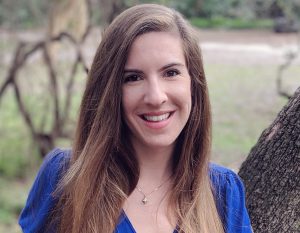 Katie McCurley, a soil and water sciences doctoral student, has always been interested in the intersection of people and the environment. She earned her bachelor’s degree in environmental economics at the University of Georgia, and wanted to pursue earth science in graduate school. She was especially intrigued by how humans impact the allocation of water resources.
Katie McCurley, a soil and water sciences doctoral student, has always been interested in the intersection of people and the environment. She earned her bachelor’s degree in environmental economics at the University of Georgia, and wanted to pursue earth science in graduate school. She was especially intrigued by how humans impact the allocation of water resources.
After starting a master’s program in environmental economics at UGA, she realized it wasn’t the best fit for what she wanted to do for for her career.
“I started looking for a program with a diverse body of students, a strong international collaborative network, and an interdisciplinary dynamic between departments,” McCurley said. “UF ticked all those boxes. Further, our former department head, Dr. Ramesh Reddy, was a contact of mine who knew exactly which advisor in the UF/IFAS Soil and Water Sciences Department would be a good fit.”
Since coming to UF, McCurley has developed what she would call “an incredible international network” through her advisor’s contacts. Dr. James Jawitz provided the path for close personal and professional relationships for McCurley in China, Korea, Germany, Sweden, and Australia. During her time in graduate school, she has participated in multi-week workshops in Korea, Germany, Colombia, at Purdue University in Indiana, and here at UF. She has also had the support to give presentations at international conferences in San Francisco and Washington, D.C.
“This global experience has been absolutely transformative,” McCurley said. “A first-hand view of the world of science prevents the student or faculty member from being pigeon-holed within a specific lab or department. It allows the framing of meaningful research that extends beyond personal perspective.”
In her advice to current and future CALS students, McCurley stressed the importance of staying the course, even when it seems like the hardest thing to do.
“I found the Ph.D. program in itself is a staircase of challenges,” McCurley said. “Don’t quit unless there is another good opportunity that presents itself. Don’t go from something to nothing. Don’t trade a clearly defined path, though it may get exceedingly difficult, for a less clearly defined path which will surely come with its own hardships (and more uncertainty). Each day is a unique obstacle to overcome, and each triumph builds on the last. The pinnacle is foundationally built on perseverance.”
McCurley hopes to use the skills shes cultivated in her degree program to fulfill needs, however they may present themselves. She is interested in seeking out a career where she can use her interest in scientific research as an avenue to applicably solve urgent issues.
After graduation, McCurley will continue working as her research laboratory’s manager.
Soil and water sciences involves managing land and water resources across a wide range of ecosystems, including agricultural, forested, range, urban and wetlands. Soil and Water Sciences students have a strong science and math background and study biology, calculus, microbiology, chemistry, physics, and ecology. Find a CALS major that suits your interests by taking our majors quiz. You can also find information regarding our undergraduate and graduate programs on our website.
 0
0
